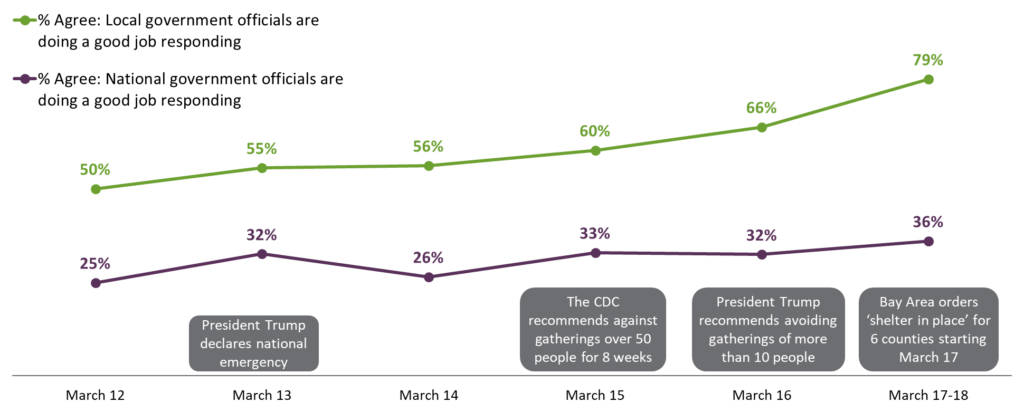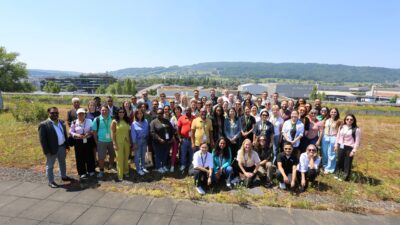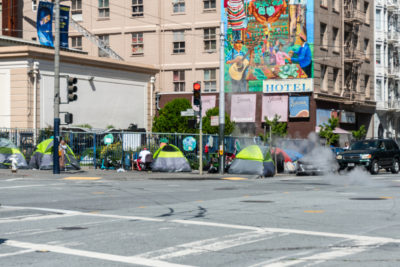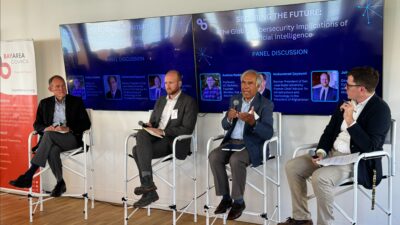Bay Area Council Poll: COVID-19 Economic Concerns Soar
Bay Area residents’ concerns about the COVID-19 pandemic rose dramatically over a one-week period in mid-March as the virus spread, casualties mounted and the government response intensified, according to the 2020 Bay Area Council Poll.
Residents surveyed in the nine-county poll hold a very dim view of the federal government’s response but praised the job local governments are doing to address the crisis. And while health officials and government leaders continue to take steps to clamp down on public gatherings and other contacts that can spread the disease, residents say they are doing everything they can to keep themselves isolated.
“Bay Area residents understand the gravity of the awful crisis we’re in,” said Jim Wunderman, President and CEO of the Bay Area Council. “Stopping the spread of COVID-19 and getting our region back to work, back to some level of normalcy must continue to be our top priority. It’s very encouraging to see residents taking the difficult steps to protect themselves, their families and their communities. The strong leadership Gov. Newsom and our mayors and other public officials are showing through the crisis is a huge reason residents feel such great confidence in our local response and why they are taking the steps necessary to distance themselves, work from home and minimize social contacts that spread the virus.”
Across the Bay Area, 87 percent of residents are concerned with the threat of COVID-19 on Bay Area communities, with 60 percent of voters very concerned and another quarter somewhat concerned (87% total concerned). This high level of concern rivals that of wildfires (58% very concerned, 88% total concerned) and climate change (56% very concerned, 81% total concerned).
Concern with the threat of COVID-19 fluctuated over the course of the data collection period as the release of new information and announcements from President Trump and other government and healthcare officials unfolded. Concern reached its peak on March 17, when six Bay Area counties joined together and ordered residents to “shelter in place”. Moreover, ratings of the local government response improved steadily over the data collection period, while ratings of the federal government response remained flat.

Eroding Economic Confidence
While economic confidence has been softening over time, voters are much more concerned about the economy now than in previous years. According to the poll, 1 in 5 say they think the economy will be doing much worse six months from now, with another third saying it will be doing somewhat worse (54% total worse). Out of those who say the economy will be worse off in six months, nearly 7 in 10 say the economic downturn will be related to the COVID-19 pandemic (69%).

Working from Home
Nearly all respondents agree that Bay Area workers who can work remotely should be required to do so (61% strongly agree, 87% total agree); more than half say they have been working remotely specifically because of concerns about COVID-19 (54% total agree). The number working from home increased drastically over the data collection period as new regulations emerged in the area: on March 12, 42% agreed they were working home specifically due to COVID-19, while by March 17 that number reached 63%.
Mirroring the response of the local workforce and officials, most Bay Area voters have also made significant changes to their personal lifestyles in response to COVID-19. Nearly all have changed activities to avoid public areas (55% strongly agree, 83% total agree) and being around other people (52% strongly agree, 83% total agree). This change in behavior spiked on March 17 with the accompanying “shelter in place” order, signifying that residents are taking orders from local government officials seriously.
Also on March 17, the number who said they had changed activities to avoid public areas jumped to 75% strongly agree from 54% strongly agree on the day prior; similarly, the number who changed their habits to avoid other people jumped to 71% from 53% on March 16. Many voters have also changed travel plans in response (55% strongly agree, 71% total agree).
Millennials/Gen Z (aged 18-39) tend to be slightly less concerned than voters of the older generations (52% very concerned, compared to 65% very concerned among Baby Boomers). However, despite the generational difference in overall concern about the coronavirus, the survey results reveal no such generational difference in behaviors that may help curb the spread of the virus, including changing activities to avoid public areas and changing activities to avoid being around other people.
Methodology
This study was completed by EMC Research on behalf of the Bay Area Council among a random sample of registered voters who responded to an email invitation to complete the survey. Demographics including age, gender and ethnicity are representative of registered voters in the 9-County Bay Area, but demographics of responses on a given day may vary slightly. The survey was conducted March 12 – 18, 2020, and had 1,000 respondents. Previous polls were conducted in 2014, 2015, 2016 (residents of the Bay Area), 2017, 2018, and 2019 (registered voters).





